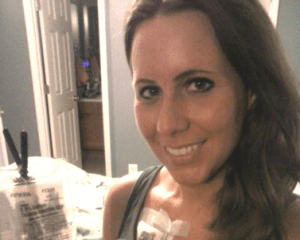Sometimes when we’re feeling low over the fact that there’s no cure for what ails people with combined variable immune deficiency (CVID), it’s hard to remember that doctors and scientists all over the world are working on our behalf.

A recent story I read made my heart glad and reminded me that perhaps there IS personalized solution waiting just over the horizon.
Here’s the short version: Harry Hill, M.D., immunologist and professor of pathology, pediatrics, and medicine at the University of Utah School of Medicine, had spent a good chunk of his career seeing patients plagued by sinus infections and pneumonia that got worse despite treatment. Often, those patients turned out to have CVID, but they’d often been misdiagnosed countless times. Hill was searching for a way to get to that all-important accurate diagnosis much sooner, but to little avail.
To say he was frustrated would be an understatement.
Then he learned that one of his patients, a 56-year old woman, shared symptoms with some of her family members. Dr. Hill had kind of an “aha!” moment. He and his team started studying the genes of the affected family members and noticed something: each of them lacked one of the two copies of a gene that codes for a protein called IKAROS. Could this be related to their CVID? And, if so, could it help diagnose other people with CVID?
MEANWHILE…in the state of New York…
Unbeknownst to Hill, at The Rockefeller University in New York, Dr. Mary Ellen Conley was coming to a very similar conclusion about some of her CVID patients. She reached out to Dr. Hill and his team in Utah, and pretty soon the IKAROS-CVID connection idea was spreading across the globe.
A worldwide team of doctors and scientists were able to identify six unrelated families with CVID who had similar symptoms and had the same IKAROS mutation. They’re excited about the implications this has on medicine’s ability to more easily diagnose CVID and develop treatment specific to the IKAROS mutation.
It’s pretty cool stuff and I encourage everyone interested in CVID to read the article—and the original research, which was published in the venerable New England Journal of Medicine on March 17, 2016 (“Heterozygous Mutations in IKAROS in Patients with Progressive Loss of B Cells and Hypogammaglobulinemia“).







